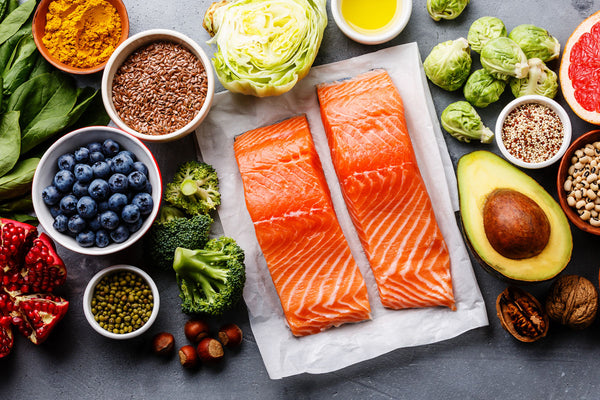Eating the right amount of calories each day is essential to achieving your transformation challenge goals -- be it muscle gain, fat loss, or general health improvement. In addition to consuming enough energy, it’s also important to consider the composition of those calories -- how much protein, carbohydrates, and fat you eat each day to reach your daily calorie requirements.
If you’ve never done this before, don’t worry. The 1UP Fitness App makes it simple. We provide customized macronutrient breakdowns based on your goals, preferences, age, equipment availability, and more. In addition to using the 1UP Fitness App or online calculators, it’s also possible to determine the right macro mix quickly and easily by hand.
Here’s how to do it.
How to Calculate Your Macros
Determining the right macro mix is pretty straightforward, but it does require a basic understanding of energy density (how many calories are in a gram of a particular food):
- Protein: 4 calories/gram
- Carbohydrates: 4 calories/gram
- Fat: 9 calories/gram
- Alcohol: 7 calories/gram
Keep in mind that it’s rare to consume foods in isolation. In other words, it’s highly unlikely you’ll consume a meal that is “pure” protein (even whey protein or egg white protein powder has very small amounts of carbohydrate and/or fat).
Regardless, once you know how many calories you need to eat daily to achieve your goals, it’s simple to determine the right macro mix.
For instance, let’s say that you want to take a “balanced” approach to your macronutrient intake, which is generally considered to be a 40/35/25 split (40% protein/30% carbohydrates/25% fat), and your calorie goal for the day is 2,000 calories.
To determine your macro mix, all you need to do is:
To determine calories from protein: Multiply 2000 by 0.4 (40%), which equals 800 calories. To determine protein macros: divide 800 by 4 (there are 4 calories/gram of protein). This yields 200 grams of protein per day, split across however many meals you want to eat during the day.
To determine calories from carbohydrates: Multiply 2000 by 0.35 (35%), which equals 700 calories. To determine carbohydrates macros: divide 600 by 4 (there are 4 calories/gram of protein). This yields 175 grams of carbohydrates per day, split across however many meals you want to eat during the day.
To determine calories from fat: Multiply 2000 by 0.25 (25%), which equals 500 calories. To determine fat macros: divide 500 by 9 (there are 9 calories/gram of fat). This yields ~55.6 grams of fat per day, split across however many meals you want to eat during the day.
Choosing the Right Macros for Your Goals/Preferences
Depending on your particular goal -- muscle gain, fat loss, keto, etc. -- will require some manipulation of your calorie/macronutrient needs. Again, the 1UP Fitness App does the “hard work” for you and can tailor the calorie and macronutrient targets for you. But, if you want to know where those numbers come from, then here is guide to show how to alter calorie needs based on your goals/dietary preferences:
Muscle/Strength Gain
Building muscle (hypertrophy) requires a calorie surplus, whereby you consume more energy than your body burns each day. Generally speaking, your calorie intake should be 10-20% higher than maintenance. Protein intake should be ~0.8-1 gram per pound of body weight, with the remainder of calories divided how you prefer between carbohydrates and fat.
Weight/Fat Loss
When trying to lose weight, you want to reduce your calorie intake 10-20% below maintenance (depending on how “aggressively” you want to lose body fat). Protein intake should remain relatively high (1-1.2 grams of protein per pound of bodyweight) -- this helps defend against muscle loss when dieting. Again, carbohydrates and fat can be allocated based on which provides the greater feelings of satiety and less feelings of hunger (high carb/low fat or low carb/high fat). At a minimum, you want to consume between 0.25-0.3 grams of fat per pound of bodyweight per day in order to supply the body with the minimum amount of essential fatty acids required for optimal health and bodily function.
Keto Diet Macros
Reaching peak popularity a few years ago, the keto diet is still prominent and sought after for individuals looking to lose weight and improve cardiometabolic health. It’s a great lifestyle fit for individuals who enjoy eating more protein and fat and less carbohydrates. The traditional macronutrient breakdown for keto diet is:
- At least 70% of calories from fat
- ~20% of calories from protein
- 5-10% of calories from carbs
Keep in mind that while there are hundreds (if not thousands of blogs, infomercials, and influencers promoting the benefits of keto diets), research shows that when it comes to weight loss and cardiometabolic health, higher carb/lower fat diets (e.g. the Mediterranean Diet) is just as effective as ketogenic diets. This means that overall daily calorie intake supersedes macronutrient ratios when it comes to weight loss. The real difference comes down to which diet do you personally enjoy more.
The Bottom Line
Choosing the right macro mix starts with your particular goals (building strength, losing fat, improving total body health, etc.). Based on that goal, you can determine the right amount of calories you need to eat each day to achieve your desired result. After that, you can calculate the right macronutrient mix. While this can be done relatively quickly by hand, the 1UP Fitness App makes it even easier.
Once you have your targets set, it’s on you to track your daily food intake (which can also be done in the 1UP Fitness App. Joining our Transformation Challenge allows you to engage in our private Facebook group where you can interact with other like-minded, goal-oriented individuals who can provide encouragement and guidance to help you stay consistent with your calorie/macro tracking and achieve the results you want!
References
- https://www.ncbi.nlm.nih.gov/pmc/articles/PMC8002540/
- Gardner CD, Trepanowski JF, Del Gobbo LC, et al. Effect of Low-Fat vs Low-Carbohydrate Diet on 12-Month Weight Loss in Overweight Adults and the Association With Genotype Pattern or Insulin Secretion. The DIETFITS Randomized Clinical Trial. JAMA. 2018;319(7):667–679. doi:10.1001/jama.2018.0245






